They have to face many problems, but they dream of finding work in Italy; they ask for greater financial support and complain about difficulties in understanding and using the Italian language; they have problems in the administrative management of scholarships and highlight the lack of tutoring. Added to all this is loneliness, the difficulty of finding accommodation and the lack of support for refugees.
Here is the photo in brief which emerges of the UNHCR report based on data from quiz answered by 194 university students requesting and receiving protection enrolled in 35 different Italian universities. The survey was presented at the “Inclusive University Manifesto” conference organized by Lumsa University in collaboration with UNHCR, the United Nations Refugee Agency, and Ruiap-Network of Italian Universities for Lifelong Learning.
The main nationalities The survey participants represented are Afghans with 24% and Ukrainians with 22%. The Congolese come in third position, with 7% of responses. Data which seems in line with the recent evolution of the migratory phenomenon in Italy, marked by evacuation operations and arrivals following the political crisis in Afghanistan in August 2021 and the conflict in Ukraine which forced millions of people to flee since February 2022, of which more than 180,000 people have requested protection in Italy.
Overall data shows that just under half of the participants (44%) have refugee status; This is followed by refugees in another country holding a study permit (16%) and holders of temporary protection (14%).
The main problems
The problems that emerge most clearly and for which the greatest support is requested are those of a financial nature (30%), the understanding and use of the Italian language (21%), the difficulty in the administrative management of scholarships studies and lack of tutoring. Which are added to problems linked to the personal sphere including loneliness, the difficulty of finding accommodation and the absence of timely support for refugees. Regarding language, knowledge of Italian represents one of the main difficulties in the process of integration into university life: 37% say they have a basic level and only 21% have an advanced level, the latter figure triples for the English language (62%).
“Refugees arrive in the host country, often without identity papers, but almost always without documents attesting to their previous studies. After all, if we too had to flee our homes in a hurry, who would think to take their exam booklet, high school diploma or school certificate with them? underlines the Professor Paula Benevene full professor of work and organizational psychology at LUMSA University and member of the Ruiap network (Network of Italian Universities for Lifelong Learning).
“In many countries, it is not possible to request documents attesting to the level of studies achieved, either because the structures simply no longer exist, or are no longer able to respond to these requests (think of country where there is war for example), either because the refugees are fleeing persecution directed against them, so they would not receive help or even by letting people know where they are, they would be putting their own security and that of members of their family in danger. This is unfortunately the situation in which practically all refugees and protection seekers find themselves who, upon arriving in Italy, wish to be able to continue their studies. They ask to apply the principles of lifelong education, according to which, according to methods of inclusion, access to education must be guaranteed for all,” continues the teacher.
“UNHCR research is important», he then emphasizes Professor Bénévene in the video interview, “because it highlights some issues, including the need for funds to support the integration of these children. We then need to create a network of social support and inclusion that helps these university students find work work and continue their studies in peace The children who participated in these inclusion projects had important results.
The dream of a job
The post-graduation work dimension is the least critical aspect that emerges from the critical aspect. Two thirds of students do not work and only a quarter have done so in the past. The majority expresses a direct interest in working in Italy: 35% after obtaining the diploma, while 26% would like to combine professional and academic development by carrying out both activities simultaneously.
10%, however, intend to continue their studies, both in Italy and in other countries. Some students (8%) express the aspiration to contribute to the development of their country of origin, with the possibility of working or studying and working. The vast majority of participants (75%) declare that they are not currently working and that to date it has not been possible to use the experiences acquired at university in the world of work: two thirds of students say they had little or no opportunity to do so.
Discrimination
According to the results of the UNHCR survey of asylum-seeking students, discrimination appears to be a problem, but if 46% say they have felt it victims of discrimination in general termsonly a quarter of them had this perception in the academic context. Overall 6% say they have suffered discrimination during their university career. Asian and African students feel this discrimination more.
35% of survey participants experienced difficulty meeting and making friends with other students. The answers given by 13% of students indicated perceived discrimination as one of the barriers to building relationships. Similarly, 22% of participants believe that only a few fellow students would be willing to listen and support them in the event of a personal problem. Finally, we note that one student in three among the participants perceives that the majority of students at their university have values and attitudes different from theirs.
The study path
There is an almost equal distribution between the participants regarding the study path, being for 48% are enrolled in a three-year degree (of which 23% are Ukrainians and 19% Afghans) while Fr49% hold a master’s degree or a specialist diploma (including 30% Afghans and 21% Ukrainians); 2% are enrolled in a master’s or doctoral program.
THE the most requested courses are: Political science and international relations (including development cooperation courses) chosen by 19% of survey participants; Engineering in economics, marketing and management, macro-category which also includes management training, chosen by 16%; take computer courses (Information Technologies) 11%.
Scholarships
The majority of students (71%) benefited from a scholarship. Among the reasons for non-use, lack of awareness of this type of opportunity predominates (41%); the proportion (a third) That declares not to have used it because the procedure is too complex. Nearly half of the scholarships are offered by universities, which demonstrates the strong involvement of academic institutions in providing financial support.
This category includes grants that are part of projects such as UNICORE and Mediterraneo, but also some specific initiatives promoted by individual universities. Scholarships at regional or local level (provided by organizations for the right to university education) represent 27%; those at national level (provided by the Conference of Rectors of Italian Universities – CRUI) 19%.
“The scholarships were awarded for seven years by the Ministry of the Interior in collaboration with Crui and the National Agency for the Right to Education. The announcement has not yet been published this year which was normally published before the summer and which allowed 100 international refugee students, having accumulated all their training credits after the first year of registration, to access the following years. The universities have had no communication, we only know that for the moment the Ministry has not published anything about access to scholarships; “so it's very difficult for a refugee student, who already has to overcome this trauma, to have the chance to get an education and graduate,” he said. Fausta Scardigna, associate professor of physiology of intercultural processes at the University of Bari “Aldo Moro” e vice-president RUIAP.
“This reduces the possibility for these people to integrate into our society, even at high levels. We are thus losing the possibility of internationalizing our universities thanks to the contribution of refugee students who often already have previous diplomas with skills recognized in their country and who only need to be promoted with a view to learning throughout the years. life-long and a competitive advantage for our universities.


